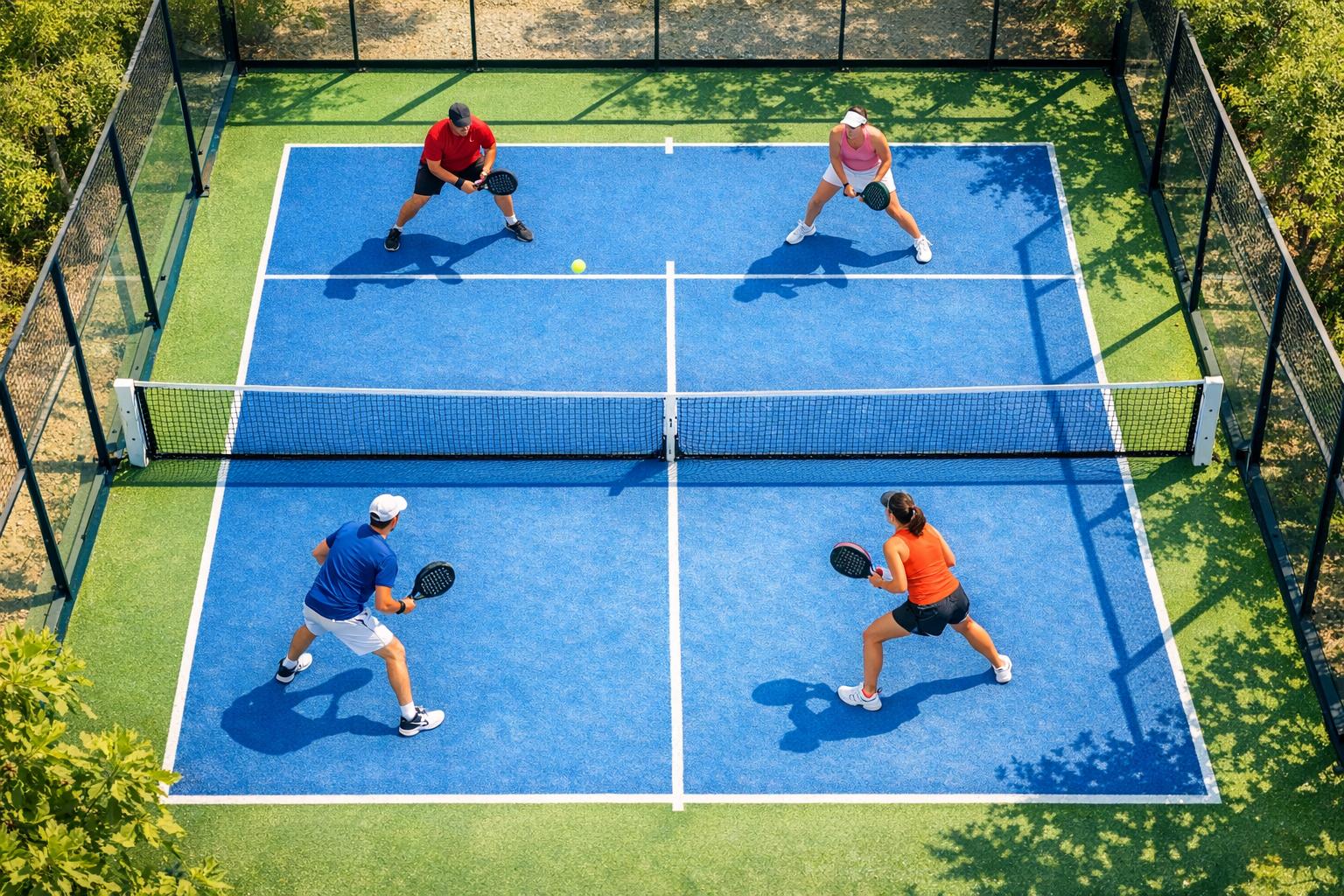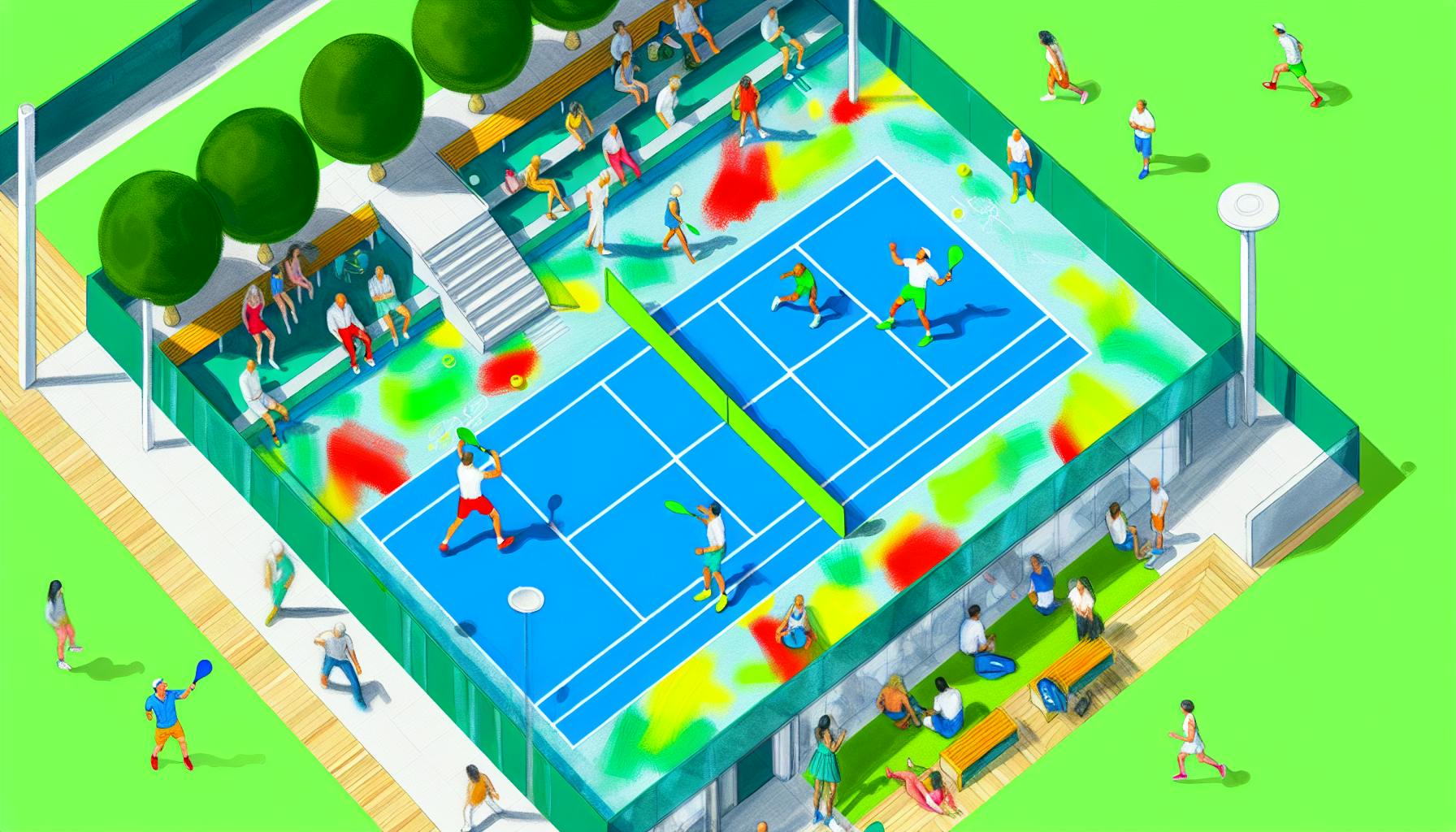Padel tennis, a sport that has seen a rapid rise in popularity across the UK, began its journey in the early 1990s and has grown significantly ever since. Here's a quick overview of its development:
- First introduced to the UK in 2011 by David Lloyd Leisure.
- Rapid expansion from 40 places to play in 2019 to plans for over 400 courts by the end of 2023.
- Integration with the Lawn Tennis Association (LTA) to promote and expand the sport.
- Significant growth in player numbers, with 89,000 people playing by 2021.
- Local and national tournaments are increasing, encouraging competitive play across all age groups.
This introduction encapsulates the essence of padel tennis's history and growth in the UK, highlighting key milestones and the sport's bright future.
Arrival in the 1990s
Padel tennis first made its way to the UK in the early 1990s, thanks to Brits who had been living in Spain and brought the game back with them. They set up the British Padel Association in 1992 to take part in the very first Padel World Championships in Madrid. Even though the UK team didn't win, they were excited about the sport and wanted more people back home to play it.
At first, there weren't many places to play padel in the UK, just a few courts here and there. It was mainly those who had lived in Spain who knew about it.
Key Developments in the 2000s
By 2003, things started to get more organized with the creation of the UK Padel Association. This helped more padel courts to be built and more people started to take notice. By 2010, there were about 20 places in the UK where you could play padel.
More people started playing padel after trying it on holiday in Spain. Local councils saw that people liked the game and started to support building public padel courts. This helped lay the groundwork for padel to become more popular in the UK.
Integration into British Sports Culture
LTA Backing and Initiatives
In 2019, the Lawn Tennis Association (LTA) decided to include British Padel as a part of its group. This was a big step because it meant they saw padel as a fun way to get more people playing tennis in the UK.
Since making this decision, the LTA has started several important projects to help padel grow:
- Padel Development Plan: This plan talks about how to build more courts and train people to work in padel. They want to have 250 courts by 2022 and 400 by 2023.
- Quick Access Loan Scheme: This helps places wanting to build padel courts by offering them up to £250k without interest. Over 50 tennis places have used this to add padel courts.
- National Padel Championships: In 2021, they held the first big padel competition for over 500 young players. They plan to do more of these in 2022.
- Talent Pathway: They're setting up a program to help talented padel players with training and support.
The LTA thinks padel is a great way to get more people interested in tennis. By adding padel to tennis clubs, more different kinds of people might start playing.
Padel Coaching and Referee Programs
To make sure padel keeps growing, the LTA started training programs for coaches and referees in 2020:
- Coaching Pathway: They've made a course for teaching padel and trained people to give these courses. They're going to start giving out official coaching titles in 2022.
- Conversion Course: They made an online course for tennis officials to learn how to be padel referees.
- Referee Structure: They're planning to set up a system for padel referees in 2022, after looking at the best ways to do this from around the world.
Having good coaches and referees is really important for padel to keep growing in Britain. As more people start playing, there'll be a bigger need for these experts.
Surge in Popularity and Infrastructure
Padel Participation Stats
Padel tennis has become really popular in the UK lately. Here are some interesting numbers:
- The number of people playing Padel went from almost none to 89,000 between 2019 and 2021.
- The amount of people playing just for fun has gone up by more than 2000% since 2019.
- The number of people playing padel in competitions has increased by 1500%.
- More people of all ages are playing, but especially those aged 25-44, who make up 43% of players.
These big jumps show that lots of people in the UK are really getting into padel tennis because it's fun and a good way to hang out with friends.
Rapid Court Expansions
With more people wanting to play, there are a lot more padel courts now:
- There are now over 150 padel tennis courts, up from about 50 in 2019.
- 105 new padel courts were built in 2021 alone.
- Lots of tennis clubs and places are adding special courts just for padel.
- There are new clubs popping up that are just for playing padel, especially in big cities.
- They're planning to add 250 more courts by the end of 2022, making over 400 across the country.
This quick growth of places to play shows that people think padel tennis has a big future in the UK.
Impact on Local Communities and Clubs
Padel tennis is getting really popular in the UK, and it's making a big difference in local areas and clubs. This sport is bringing people together, helping communities grow stronger, and getting all kinds of people to play.
Fostering Tighter-Knit Communities
Padel tennis is easy to get into and fun, which means it's great at bringing people together. Local clubs are places where everyone can meet, play, and make new friends.
"Our club feels like a big family," says Maria, who runs the East London Padel Club. "It's great to see the same faces, support each other, and get better at padel together."
Lots of people say they've made good friends through padel, both while playing and just hanging out.
Attracting New Demographics
Padel tennis is also good at getting all sorts of people to play. Unlike some sports that mostly men play, padel sees just as many women on the courts. It's also popular with both beginners and those who like fast-paced games.
"We're seeing a mix of women, young people, and older players," Alan, a padel coach in London, tells us. "Everyone is welcome to try it out here."
Padel is welcoming and doesn't need you to be super skilled to start, making it great for anyone wanting to be active and social.
Driving Grassroots Developments
With more people playing Padel, local clubs and communities are doing a lot to help the sport grow from the ground up. They're organizing events, building new places to play, and getting kids involved.
Key Contributions
- Setting up tournaments and events to get people excited
- Starting programs for kids to build a strong base
- Asking for public padel places
- Working with sports groups for money and help
- Being the go-to places for learning padel and joining leagues
People who love padel are working hard to make sure it keeps growing in the UK. Their efforts mean the sport's future looks bright, with more people playing and enjoying it.
sbb-itb-5591e69
Rising Tournament Scene
Competitive padel is getting more popular, with more tournaments for players of all ages. These events are great for showing off your skills, gaining experience, and making friends who also love padel.
Surge in Junior Competitions
Kids' padel competitions are on the rise, giving young players a chance to improve their game. Here's what's happening:
- Local junior padel tours are popping up, leading to big finals like the England Junior Open.
- Schools are getting into padel too, with some even setting up their own courts for tournaments.
- Clubs and academies are teaming up to offer top-notch training for the most promising young players, who also get to compete internationally.
These efforts are helping to build a strong base of young players, who could become the next big names in British padel.
Expansion of Local Leagues
Local clubs are busy setting up leagues and tournaments for adult players who just want to have fun and stay fit.
- Clubs often have weekly or monthly leagues, where you can play just for fun or get competitive.
- Clubs also compete against each other in friendly leagues, with a trophy for the winning club.
- There are also big local tournaments that anyone can join, bringing together hundreds of players.
These local leagues are perfect for adults looking to enjoy padel with others who are at a similar skill level.
Emergence of Premier National Events
For the very best players in the UK, there are big tournaments where they can compete against each other.
- The British National Padel Championships is a huge event, with over 500 players competing.
- At the 2022 Home Nations Championship, England beat Scotland, showing that the level of play in the UK is getting better.
- The UK Padel Tour, which started in 2018, holds tournaments all over the country. Winners get prize money and points.
- Some UK players are even making it to international competitions. For example, Liam Duncan made it to the round-of-16 in a tournament in Qatar.
As more people play padel, these tournaments offer a great way for everyone to get involved, challenge themselves, and enjoy the community spirit of the sport.
Outlook for the Future
Padel tennis is really taking off in the UK, and it looks like it's going to get even bigger. More courts are popping up, and more people are playing, making padel more popular every day.
Continued Infrastructure Expansion
We're going to see a lot more padel courts around the UK, growing from 40 in 2019 to over 400 by the end of 2023. This growth will come from:
- Adding padel courts to places where people already play tennis or go for sports
- Opening new places just for playing padel, especially in big cities
- Schools and universities getting their own courts to get students into the game
- Better training spots for players who want to get really good
With more places to play, more people can try padel, making it a common sport.
Inclusion in Educational Institutions
Getting padel into schools and colleges is a smart move. It's a new sport for many, so starting young can make a big difference.
Here's what might happen:
- Schools could add padel to gym classes
- Colleges might start their own padel clubs and competitions
- Schools and colleges could build their own padel courts
- Young players could get lessons to start playing
By getting kids and teens into padel early, they might stick with it, play in tournaments, or even make it their career.
Expanding Local and National Events
Having more tournaments for amateur players is important. These competitions help build a community of players and let everyone see how fun padel can be.
We might see:
- More tournaments at local clubs
- Bigger competitions that cover larger areas, like county championships
- New nationwide tournaments for players of all ages
- More chances for players to join international competitions
More tournaments mean more chances to play and watch padel, which can bring in new players.
Inclusion of Diverse Player Groups
Padel tennis is popular because different kinds of people enjoy playing it. But making sure everyone feels welcome will help padel grow even faster.
This means:
- Keeping a good balance of men and women playing and competing
- Reaching out to people from all backgrounds
- Making sure there are ways for people with disabilities to play
- Supporting events for the LGBTQ+ community
Making padel welcoming for everyone is key to its success in the UK. When everyone can play, the padel community gets stronger.
Conclusion
Padel tennis has grown a lot in the UK since it first started in the 1990s. Back then, only a few people knew about it, but now there are over 150 places to play and 89,000 players. This shows how much the game has become a part of sports in the UK.
Organizations like the LTA have helped a lot. They've set up plans and helped fund new courts and training for coaches and referees. At the same time, the number of places to play padel has quickly gone up all over the country.
Local clubs and communities have also been important in making padel more popular. They've made sure everyone feels welcome and have organized events to get more people interested.
Looking ahead, padel has a bright future. With plans to build more courts and keep making the game welcoming for everyone, it's likely to become even more popular. Padel is fun, easy to start playing, and a great way to meet people. It's already well-loved in the UK, and it seems like it's just getting started.


